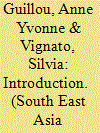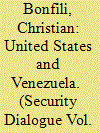|
|
|
Sort Order |
|
|
|
Items / Page
|
|
|
|
|
|
|
| Srl | Item |
| 1 |
ID:
028176


|
|
|
|
|
| Publication |
New York, Columbia University Press, 1969.
|
| Description |
xiii, 418p.
|
|
|
|
|
|
|
|
|
|
|
|
Copies: C:1/I:0,R:0,Q:0
Circulation
| Accession# | Call# | Current Location | Status | Policy | Location |
| 004085 | 303/BUR 004085 | Main | On Shelf | General | |
|
|
|
|
| 2 |
ID:
128881


|
|
|
|
|
| Publication |
2013.
|
| Summary/Abstract |
This Special Focus is the second part of 'Life after collective death in South East Asia', a collection of papers examining what happens after wide-scale destruction has occurred and how the social and individual lives of the survivors recover. Part 1, published in South East Asia Research in June 2012 (Vol 20, No 2), focused on the social and religious processes that help the '(re-)fabrication of social bonds'. Part 2 deals with another major aspect of resilience - the issue of help, especially in the case of international humanitarian aid. In many ways, in the contemporary situation, it is taken for granted that help will be provided. We question the evidence for this, asking what rationales are involved in post-catastrophe help. We shed light on why, for example, people decide to engage in non-governmental organizations (NGOs) to help distribute drugs in a Cambodian outpatients ward or, alternatively, to carry rice sacks in the Ayeyarwady Delta to help victims of the typhoon in Myanmar. We highlight why people in the West consider such activities 'normal'. We focus on how people, having been labelled as 'victims', receive and perceive such aid and how they respond to it. Further, we ask how (and to what extent) aid contributes to change, implicitly or explicitly, in the societies affected. Finally, we question what contemporary international aid brings when compared to the older local relief systems and systems of mutual help, particularly those examined in Part 1.
|
|
|
|
|
|
|
|
|
|
|
|
|
|
|
|
| 3 |
ID:
122501


|
|
|
|
|
| Publication |
New York, Oxford University Press, 2012.
|
| Description |
xii, 258p.Hbk
|
| Standard Number |
9780199739394
|
|
|
|
|
|
|
|
|
|
|
|
Copies: C:1/I:0,R:0,Q:0
Circulation
| Accession# | Call# | Current Location | Status | Policy | Location |
| 057376 | 303.482/KUP 057376 | Main | On Shelf | General | |
|
|
|
|
| 4 |
ID:
101487


|
|
|
|
|
| Publication |
2010.
|
| Summary/Abstract |
US-Venezuelan relations dramatically worsened under the Bush and Chávez administrations. Notwithstanding, evidence suggests that increasing polarization has not weakened mutually beneficial economic ties. How can we account for the co-existence of interdependence and antagonism? In addressing this question, this article examines both the economic/energy and the political/strategic sectors of bilateral interaction. It argues that the co-existence of interdependence and antagonism needs to be understood within the wider context of two simultaneous yet divergent constellations of socially constructed perceptions, identities, and practices. While the constellation driving political/strategic interaction has revealed the internalization of role identities reflecting rivalry, the one guiding energy interaction has been sustained by role identities reflecting partnership based on interest. Significantly, the former has not taken over the latter, as the lack of shared threat perceptions relative to energy interdependence is the result of deeply internalized identities and a highly institutionalized social process. As a corollary, neither of these constellations has come to govern overall US-Venezuelan relations, and thus co-existence will most likely endure unless energy interdependence becomes the object of processes of constructing threat perceptions.
|
|
|
|
|
|
|
|
|
|
|
|
|
|
|
|
|
|
|
|
|